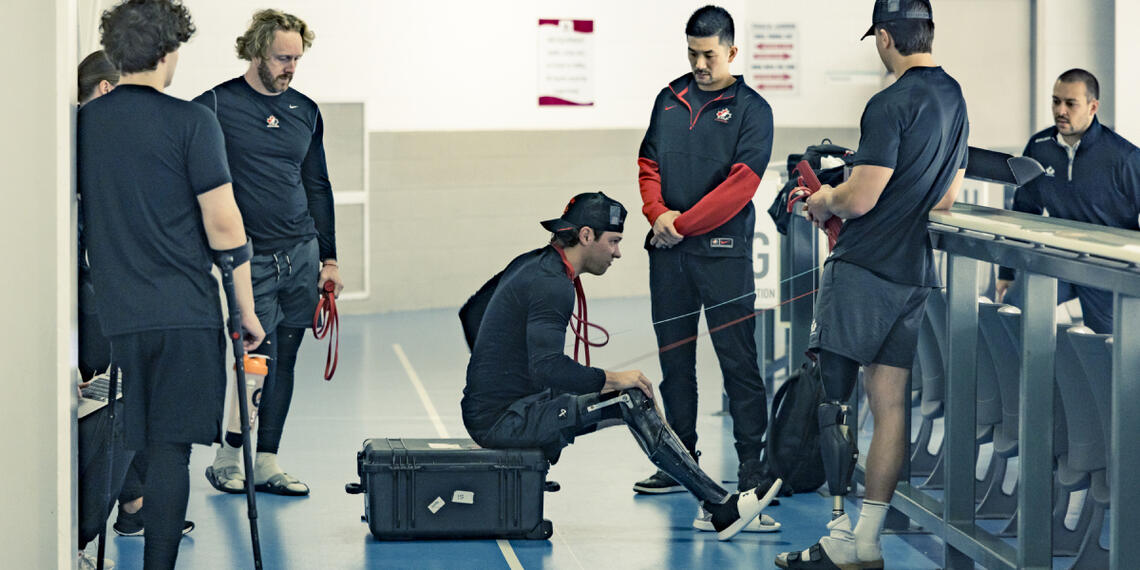
Jan. 13, 2025
Five Tips to Stay on Track with Your 2025 Health Goals
New year, new goals! Whether you’re aiming to hit the gym more often, eat fewer late-night snacks or finally take up that yoga class you’ve been eyeing, staying on track with your health-related resolutions can always be a little tricky. Luckily, we’ve got some expert advice to help you stick to your plans long after that initial January motivation fades.
Enter Bryan Yu, MSc’23 — a strength and conditioning coach who’s basically seen it all when it comes to setting and smashing goals. Since joining the Canadian Sport Institute Alberta team in 2014, Bryan has worked with multiple Canadian national and development team Olympic Athletes, served as the lead performance coach for the Chinese national speedskating team and has led the strength training for Hockey Canada’s Men’s National Para Hockey Team for the past two paralympic quadrennials. In short, if there’s anyone who knows how to turn ambitions into real results, it’s him.
With his years of experience coaching elite athletes and a master’s degree from the University of Calgary under his belt, Yu is here to share his top five tips for making 2025 your healthiest year yet.
Ready to get started? Let’s dive in!

From warm-ups to world-class competition prep, UCalgary grad Bryan Yu ensures elite Olympic and Paralympic athletes are ready to perform at their best.
Dave Holland / Hockey Canada Images
Tip 1: Set a Few Specific Goals
“We often set too many goals that are too general,” Yu explains. “At the end of the year, it becomes difficult to achieve all of them, and it’s hard to even identify whether or not you actually met your goals.”
Research shows that specific and challenging goals not only significantly enhance motivation and performance, there are also concurrent psychological and psychophysiological effects, so aim for clarity and precision in your resolutions. Further research indicates that setting, elaborating and reflecting on personal goals can improve academic performance. This suggests specificity and personal relevance in goal-setting are crucial for success.
“Clear and realistic goals provide direction and purpose, making it easier to stay focused and motivated,” says Yu. “Without a clear attainable target, it’s easy to feel overwhelmed or lose track of progress.”
“A plan bridges the gap between setting a goal and achieving it,” says Yu. “It ensures you know what steps to take, think of it as a road map to help you navigate challenges and stay on course.”

Yu has gone through the process of goal setting and executing plans with athletes which have timelines as long as four to eight years.
Heather Pollock | Hockey Canada Images
Tip 2: Make Plans for Your Goals
The concept of "implementation intentions" involves creating specific plans that outline when, where and how you will act toward your goals. This method has been shown to significantly increase the likelihood of achieving health-related behaviours.
“A plan bridges the gap between setting a goal and achieving it,” says Yu. “It ensures you know what steps to take, think of it as a road map to help you navigate challenges and stay on course.”
According to the Journal of Applied Sport Psychology, goal-setting is most effective when paired with external monitoring and face-to-face delivery, highlighting the importance of intentional planning. Whether it’s breaking your goal into smaller steps or scheduling regular progress reviews, a plan transforms intentions into actionable steps.
However, Yu advises caution. "There’s research suggesting that, when you talk about your goals too much, especially with people who aren’t really involved in holding you accountable, it can create a trigger - a premature sense of accomplishment which can potentially reduce your motivation to achieving the goals”
His advice? "Share your goals thoughtfully — enough to stay motivated and be held accountable but not so much that you lose focus and stick to your existing support circle of people who truly care about your success.”

From goal-setting to execution, Yu supports athletes in staying focused, planning effectively, and achieving long-term results
Dave Holland / Hockey Canada Images
Tip 3: Set Up a Network for Support and Accountability
A wide range of studies and surveys indicate that approximately 80% of resolutions will be abandoned by February, if they are even made at all. Embracing accountability can be the key to bridging the gap between setting goals and achieving lasting change.
“Sharing your goals with others can increase your commitment and provide valuable encouragement during setbacks,” Yu notes, highlighting the power of support networks to keep one accountable and motivated. “Support networks not only offer accountability, but also remind you that you’re not alone in your journey.”
Research supports this approach. A randomized controlled trial showed that human support, whether from a coach or peer, improves adherence and increases success rates. Surround yourself with people who will cheer you on and help you overcome challenges.
"Accountability looks different for everyone," Yu explains. "Some people prefer to keep it within a very close circle — like, for me, I’d share my goals with my partner and no one else. Others find that sharing on social media can be a fantastic motivator, especially if they’re already comfortable posting to a wider audience"

Yu emphasizes that celebrating even the small milestones boosts motivation, reinforces positive behavior, and will make the journey more fulfilling.
Dave Holland / Hockey Canada Images
Tip 4: Celebrate the Wins
Experts say acknowledging progress, no matter how minor, helps sustain long-term commitment to health goals.
“Celebrating progress, no matter how small, helps sustain motivation and reinforces positive behaviour,” Yu advises. He encourages acknowledging milestones along the way to create an emotional boost and foster a sense of accomplishment. “By celebrating your achievements, you make the journey more enjoyable and fulfilling.”
Studies show that celebrating successes enhances self-regulation and promotes sustained effort. Take time to reward yourself and also recognize the accomplishments of your teammates or support group.
“On an elite athlete-level team, we often share our goals and plans with each other,” says Yu. “So, celebrating the wins is easy because we all see the progress and we also support each other through any losses”
5. Be Patient and Consistent
Success isn’t about quick fixes, says Yu. “It’s about cultivating habits that stand the test of time. In sports, often our goals are super long-term — some goals are even four or eight years long.”
He stresses the importance of patience and consistency, even when progress feels slow.
“Consistency, even in small efforts day to day lays the groundwork for meaningful change,” Yu says.
According to the European Journal of Social Psychology, it takes an average of 66 days for a behaviour to become automatic. Yu’s advice? “Stick with your goals, trust the process and remember that lasting success takes time.”
Now, with this expert advice, you’re ready to take on your 2025 health goals with confidence and purpose. Focus on a few specific targets, plan effectively and stay consistent. Most importantly, celebrate your wins and surround yourself with a strong support network.
This year, make your resolutions more than just words — turn them into meaningful, lasting change.

Heather Pollock | Hockey Canada Images
About Bryan Yu, MSc’22
Bryan Yu is a highly respected strength and conditioning coach with experience training Olympic and Paralympic athletes. A graduate of the University of Calgary with a Master’s in Kinesiology, Bryan specializes in helping individuals achieve peak performance and maintain long-term wellness.
Connect with Bryan:

